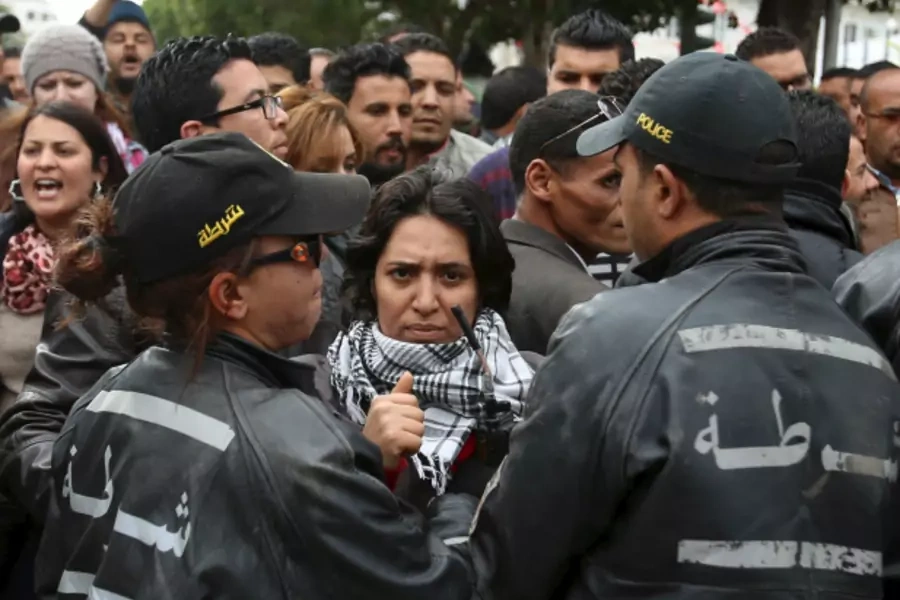Tunisia: Saving Democracy in the Middle East? Really?

Last Wednesday, the Washington Post ran an op-ed called “We Can—And Must—Save Tunisia from its Troubling Recent Descent” under the byline of Marwan Muasher and William J. Burns. Muasher was Jordan’s foreign minister from 2002 to 2004, deputy prime minister from 2004 to 2005, and now serves as vice president for studies at the Carnegie Endowment for International Peace (CEIP). Burns had one of the most distinguished careers in the U.S. foreign service, rising to become deputy secretary of state from 2011 to 2014. After he left government, he became Muasher’s boss as president of CEIP. Needless to say, these gentlemen know of what they speak. Their clarion call to help Tunisia is important for a variety of reasons, not least of which is the recognition that the country is not the “Arab Spring success” that it is often portrayed to be. The United States should help Tunisia, but mostly because it will help Tunisians, and not for the additional reasons that Muasher and Burns lay out, which amount to a reformulation of something called the “international demonstration effect.”
Since transitions to democracy failed to materialize after the uprisings, especially in Egypt, there has been a lot of loose talk about how Tunisia’s tenuous democratic progress could have an impact on other countries in the region if it were to succeed. Muasher and Burns sum up this view well in the third paragraph of their piece:
More on:
Although it only has 11 million people and an economic output less than that of Rhode Island, Tunisia matters—to regional order, to the fate of reform and democracy in the Arab world and to the United States.
That is quite a statement for a country that, less than a decade ago, was a backwater of U.S. policy in the Middle East and North Africa. No longer. Last May, President Barack Obama made Tunisia a major non-NATO ally, with all of the privileges that go with that designation. He even went so far as to coauthor an opinion piece with his Tunisian counterpart, Beji Caid Essebsi—an extraordinarily rare privilege for a foreign head of state. This was all done in an effort to validate what Tunisians had accomplished since they pushed Zine al-Abidine Ben Ali from power in January 2011, to encourage them to do more, and to demonstrate to the region the benefits of positive change.
The underlying assumptions concerning Tunisia’s potential importance to the domestic politics of other countries can be traced—as far as I can tell—to the role Tunisia played as an alleged catalyst of uprisings elsewhere in the Arab world in 2011 and the academic literature on the spread of war, democratization, and the role international linkages play in both. Scholars have established that international demonstration effects do exist, especially in the “diffusion” of war and in waves of democratization. Yet like a lot of concepts that have first appeared in the pages of specialty academic journals, however, the idea lost some of its nuance in policy discussions.
Before proceeding one caveat is in order. I am not interested in scoring points against Muasher and Burns, who are exemplary public servants and fine scholars. Still, they are the most prominent within the subset of the policy community that cares enough about democracy in the Middle East to articulate the idea that Tunisia’s achievements can translate into success around the Middle East. This is important because to have a good foreign policy, policymakers need to have good assumptions about the way the world works. In this case, Muasher, Burns, and others might want to reexamine theirs. Indeed, the focus on Tunisia as the demonstrator of democracy gets the concept somewhat backwards. The literature indicates that a given country is more likely to become democratic when it is surrounded by democracies rather than the other way around. That is to say that a single apparent democratizer is unlikely to influence the political dynamics within its authoritarian neighbors. One study found that societies need to be receptive to change for an international demonstration effect to be possible in the first place. If Tunisia were going to rub off on Libya or Egypt or Algeria or any other actor in the region, political actors in those countries would need to be amenable to the lessons of Tunisia’s transition. I have no doubt that there are many people in these countries who want to live in democracies, but elites in these places have proven they have the power—at least in the short run—to thwart those democratic dreams.
The United States and other global powers should help Tunisia because this assistance might advance the promise of Tunisia’s uprising, which would be good for Tunisians. Yet to suggest that this help is critical because it would advance democratic change elsewhere in the Middle East seems, under current circumstances, to be an analytic stretch. Rather, like so much else related to Tunisia these days, it is based more on a leap of faith.
More on:
 Online Store
Online Store